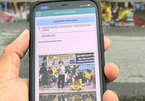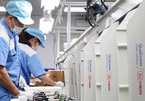 |
| The use of AI in scientific research is increasing. |
The pandemic has shown humanity how AI works and what it can do in many different ways. Right from the start, AI helps us learn about SARS-CoV-2, the virus that causes the Covid-19 pandemic. AI helps scientists analyze the genetic information, or DNA, of the viruses quickly. Artificial intelligence also helps scientists know how quickly viruses mutate and helps them develop and test vaccines.
AI can be understood as a set of instructions by which it tells a computer what to do, from recognizing faces in a photo album on a phone, to sifting through vast troves of data to find "a needle in a haystack". People often call it an algorithm. It sounds confusing, but an algorithm is just a list of rules for computers.
Machine learning (ML) algorithms are the kind of AI that scares a lot of people. It is a form of artificial intelligence that can learn from what it reads, and analyze and teach itself new things. Humans often feel out of control or even unable to know what machine learning algorithms do. In fact, there is nothing to fear, because people wrote the original code themselves.
In short, AI and ML are programs that allow humans to process a lot of information and raw data at a very rapid speed. They are not “monsters” that have killed or taken our jobs.
AI and ML can help save lives during the Covid-19 pandemic. They are used in diagnostic tools, and help to read X-rays faster than any specialist. AI and ML also help doctors identify and track Covid-19 patients.
 |
In Nigeria, this technology has been used at a very basic but practical level to help people assess their risk of infection. People answer a series of questions online. Based on the answers, AI will give medical advice or recommend that they go to the hospital. This helps to reduce the number of people calling the disease control hotline unnecessarily.
One of the most important things during a pandemic is to find people infected with the virus quickly. In South Korea, AI has brought opportunities for doctors. While the world was wondering if it was time for the first blockade, a company in Seoul used AI to develop a Covid-19 test kit in just a few weeks. Without AI, this process would have taken months.
Korean scientists were on the right track because by mid-March 2020, the country had tested 230,000 people. Thus, at least for a short time, South Korea could keep the number of new daily infections relatively stable.
According to a survey conducted with US health leaders in the fall of 2020, 50% of participants said they had used AI to manage issues related to the Covid-19 pandemic in the US.
AI assists in controlling new waves of infections
 |
| AI is used to recognize faces and detect people with high body temperature in a crowd. Photo of Wfeo |
One of the big problems that health professionals have to deal with is tracking how diseases, especially their variants and mutations, spread within communities and from country to country.
In South Africa, scientists used an artificial intelligence-based algorithm to predict daily confirmed Covid-19 infections in the future. This is based on historical data from South Africa's past infections and various other information, such as how people move from one community to another.
In May, scientists found that South Africa was at low risk for the third wave of Covid-19. “People think that the Beta variant will spread across the continent and overwhelm our health system, but with AI, we can control that,” said Jude Kong, head of the Africa-Canada Artificial Intelligence and Data Innovation Association
That AI model has also been deployed in other African countries like Botswana, Cameroon, Mozambique, Namibia, Nigeria, Rwanda, and Zimbabwe.
Some other types of AI, like facial recognition algorithms, can also be used to detect infected people or people with fever in crowds. In addition, AI-powered robots can clean hospitals or other public areas.
Phan Le

Mobile apps help city to fight Covid-19
Due to the complexity of the latest Covid-19 outbreak in HCM City, residents have been asked to download and install the apps named ‘Y Tế HCM’ and ‘Tổng đài 1022’ on their iOS or Android devices for ease of health declaration and information updates.

AI shaping promising future in Vietnam
In the last few years, technological giants in Vietnam have poured their resources into developing Artificial Intelligence technology (AI) in both manufacturing and trading activities as well as the digital transformation process.

AI, IoT solutions used in COVID-19 screening at quarantine areas
Non-touch temperature screening kiosks and cameras as well as software modules using Artificial Intelligence (AI) and Internet of Things (IoT) should be set up in high-risk Covid-19 locations, including quarantine areas, experts have said.